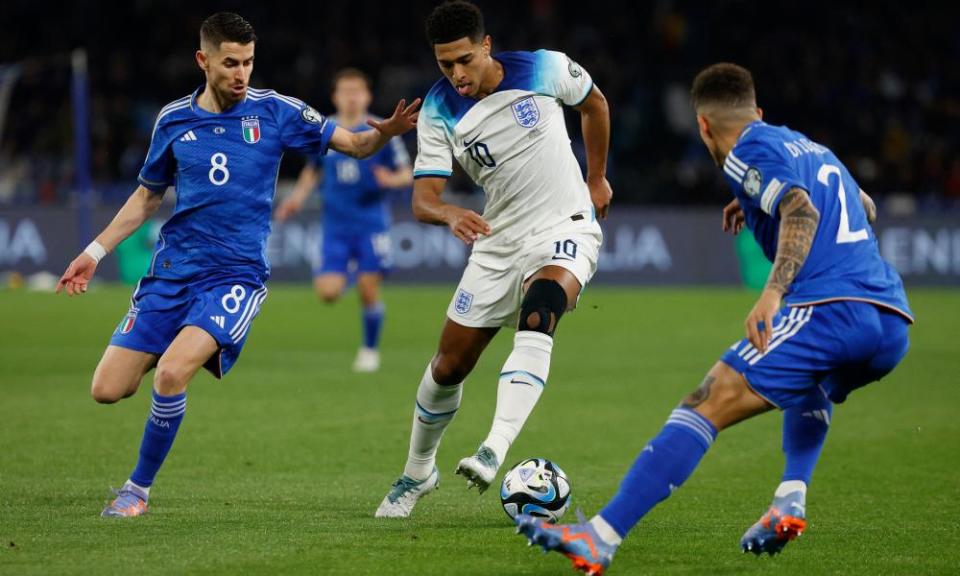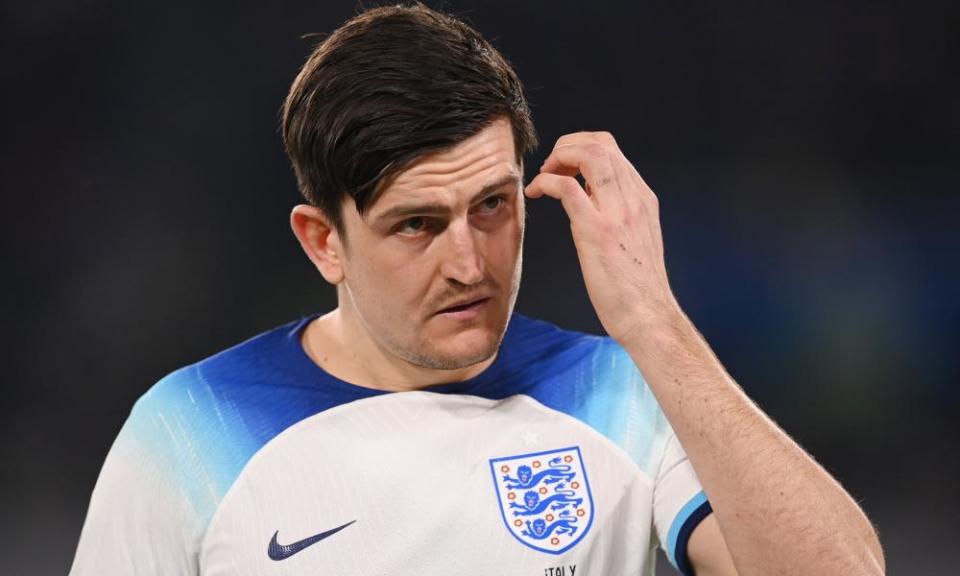Jude Bellingham shows England’s potential before old flaws emerge

England can already see a path to glory at Euro 2024. If that sounds like the usual triumphalism then consider how mature Gareth Southgate’s team looked during the first 45 minutes in Naples on Thursday night. There was a boldness to England, an easy balance in midfield, invention and incision in attack, and Italy could have had no complaints if the game had been over as a contest at half-time.
The defending European champions – the team who broke England’s hearts at the last Euros – were lucky not to be 3-0 down. There was a glaring miss from Jack Grealish, who passed up an open goal moments after Harry Kane had become his country’s record goalscorer, and a constant sense that England were too quick, physical and talented for the Italians, particularly with Jorginho and Marco Verratti looking too old to compete with Jude Bellingham and Declan Rice in midfield.
Related: Harry Kane reels in Rooney for England goals record like a hunter with its prey | David Hytner
Those were the moments when Southgate’s decision not to quit after the defeat by France at the World Cup made sense. France are wary. They believe that England will be their biggest threat in Germany next year. The French know all about Bukayo Saka after seeing the winger torment Théo Hernandez in Qatar. They have seen Bellingham and Rice go toe to toe with their midfield. They think that England, who will be even better if the likes of Phil Foden and Reece James can push on at international level, are on the right track under Southgate.
The potential was obvious during the first half in Naples. Kane was outstanding, confusing the Italian defence with his movement and bullying them with his strength. The captain epitomised England’s authority. In the final of the Euros Southgate had reverted to caution, sacrificing a midfielder by playing a back three, leaving Rice and Kalvin Phillips outnumbered in the middle. There was too much emphasis on containment. England could not push on after going ahead at Wembley. Jorginho, Verratti and Nicolò Barella slowly but surely took control of midfield away and, with the help of some clever substitutions from Roberto Mancini, Italy found a route back into the game.
But it was harder for Italy’s midfield trio in Naples. Southgate found a different gear in Qatar, embracing the 4-3-3, making the most of Bellingham’s emergence. The 19-year-old has transformed the mood. Southgate can still lean on the double pivot of Rice and Phillips but he can do so in the knowledge that he has Bellingham, who was key to that superb first half against Italy, his touch and dynamism repeatedly allowing England to turn defence into attack.
So that was the future. But then came reminders of the past. At half-time it was possible to imagine Mancini marching into the home dressing room and simply saying: “Lads, it’s England.” There was an instant shift in the second half. Italy did not make it to the World Cup. They have lost Giorgio Chiellini to international retirement. Leonardo Bonucci, Ciro Immobile and Federico Chiesa were missing. Their centre-backs, Rafael Tolói and Francesco Acerbi, are nothing special. Their new striker, Mateo Retegui, has been spirited away from Argentina.

But still England retreated, almost out of force of habit. It felt instinctive. Inhibition took over. It has happened on so many occasions against top teams, under Southgate and his predecessors, and Italy were waiting for it.
Mancini was positive. He had his team playing higher, giving Verratti and Jorginho more space, and England paid for dropping off. “If you start any second half like we did you will be in trouble,” Southgate said. “We conceded a really poor goal. There were several errors in the lead-up to it.”
It was not a surprise when Retegui scored his debut goal. England were making errors in possession and inviting pressure with their passivity. With control slipping away, Harry Maguire tried too hard to grab it back. After 56 minutes the centre-back rushed out of defence after losing the ball. But Italy just played around him and England were exposed as Lorenzo Pellegrini sent Retegui through to beat Jordan Pickford.
Familiar flaws had taken hold. The worries over Maguire’s cumbersome movement resurfaced but Southgate is short of alternatives. The talent pool is not as deep as it could be. Good teams targeting Maguire could be England’s undoing, but who else is out there?
Southgate has to make compromises. It is not ideal that he has to lean on Phillips, who has not started a league game for Manchester City this season. He is a good player but is short of sharpness and looked rusty against Italy. He twice lost the ball in dangerous areas early on and was poor in possession during the second half.
England needed more composure. At one stage Grealish tried to find Luke Shaw, only to play the ball behind for a corner. England were careless. Shaw’s red card, earned for two bookings in the space of 54 seconds, would have been avoided if Kane or Saka had put the ball out of play when Maguire was down injured.
“We had an opportunity to break that passage up,” Southgate said. He saw naivety. Others will see indecision from Southgate. Mancini had made four substitutions by the time England made their first, with Foden coming on for Grealish in the 69th minute. Again the question will be whether Southgate responds when opposition coaches tweak their tactics.
In Southgate’s defence, though, his substitutions after Shaw’s dismissal worked well. He used Conor Gallagher’s energy and shut down the flanks by introducing James and Kieran Trippier. There were no scares. England had their statement win: their first in Italy in 62 years. But they also have room for improvement.

 Yahoo Sport
Yahoo Sport 





































